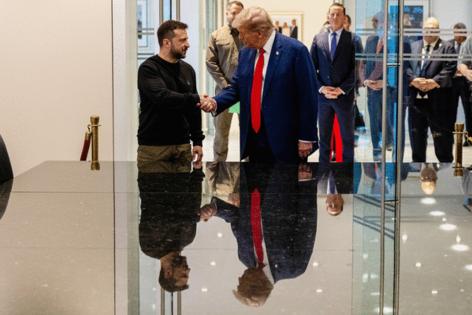Trump is shaping US foreign policy well before he takes office
Published in News & Features
WASHINGTON — President-elect Donald Trump doesn’t take office for more than two months but he’s already shaping U.S. policy in two major hot spots: Israel and Ukraine.
With phone calls to the leaders of both nations, and another expected with Russian President Vladimir Putin, Trump’s victory — and the possibility he will seek major policy changes — is reverberating in both countries and well beyond.
One former Trump administration official, who asked not to be identified discussing private assessments, said the president-elect will have an immediate head start thanks to the perception that he will be tougher than his predecessor. U.S. adversaries may change their behavior in advance, the person said — some deterred by the threat of U.S. retaliation, and others seeking to exploit their remaining leverage before President Joe Biden leaves office.
That’s being felt most acutely in Ukraine. Trump promised during the campaign to solve the Ukraine crisis before Inauguration Day, and President Volodymyr Zelenskyy is already scrambling to catch up. Tesla CEO and Trump supporter Elon Musk was in the room for Zelenskyy’s call with Trump this week, according to a person familiar with the matter. Musk has previously advocated for a negotiated solution in which Ukraine gives up some of its territory.
Trump’s election “has changed the Ukrainian rhetoric and planning in their views about negotiations,” said Shelby Magid, deputy director of the Atlantic Council’s Eurasia Center. Magid said Ukraine is “moving in the direction — knowing that Trump has won — of accepting that negotiations are a reality.”
Transitions between election and inauguration are always turbulent, especially when the president’s party changes. That’s even more extreme this year given Trump won so convincingly and has been so explicit in his belief that Biden’s policies must be shunted aside.
That’s handcuffed the Biden administration. U.S. officials and outside observers conceded in the weeks leading up to the election that several key foreign policy priorities were essentially in a holding pattern as adversaries and allies alike waited to see who would be the 47th president.
Biden administration officials have said publicly that they intend to continue carrying out the president’s foreign policy. “We have no shortage of work to do over the next 74 days, and we are determined to make the most of the time left,” State Department spokesperson Matthew Miller told reporters in Washington on Thursday.
“An incoming president can make his own policy changes, his own policy decisions,” Miller said.
Zelenskyy, in a tweet congratulating Trump on the election, said he hoped they could work together to implement “peace through strength” and that his country was “interested in developing mutually beneficial political and economic cooperation that will benefit both of our nations.”
In a meeting Thursday with European leaders, Zelenskyy argued that concessions by Kyiv would be “unacceptable for Ukraine and suicidal for all of Europe.”
“We would like a fair ending to the war,” Zelenskyy said. “A quick ending would be a loss.”
Putin congratulated Trump on his victory and said he’s ready to hold discussions with the new American leader.
“It seems to me, it deserves attention what was said about the desire to restore relations with Russia, to help end the Ukrainian crisis,” Putin said late Thursday at the annual meeting of the Valdai Club in the Black Sea city of Sochi.
The country whose leader benefits the most from Trump’s arrival is Israel. Prime Minister Benjamin Netanyahu is a longtime ally of Trump’s and had a tense relationship with Biden as the United States pressed for an end to the Israeli campaign in Gaza.
Trump has already signaled he would leave Israel a freer hand to strike against Iran’s nuclear program, especially if Tehran indicates it may shift its policy and seek a nuclear weapon.
“Congratulations on history’s greatest comeback!” Netanyahu wrote in a tweet after Trump won. “Your historic return to the White House offers a new beginning for America and a powerful recommitment to the great alliance between Israel and America.”
The fact of an electoral result is itself reassuring for some countries, which were preparing for either outcome but unable or unwilling to move forward without knowing who would lead the U.S. and in what direction.
“Deeply ingrained in his attitude is the desire to keep everybody off balance,” Jon Alterman of the Center for Strategic and International Studies said of Trump. “All of our European allies, especially, are desperate to lock in whatever they can lock in.”
While a victory by Vice President Kamala Harris might have motivated Netanyahu to make some concessions ahead of her inauguration, Trump’s win empowers the prime minister, said several people familiar with the situation who requested anonymity to speak freely about a sensitive subject.
Netanyahu could be less resistant to pressure from Trump over Gaza because he views the president-elect as more aligned with him on core issues such as Iran, but there may still be limits to Trump’s leverage, said Jonathan Panikoff, director of the Scowcroft Middle East Security Initiative at the Atlantic Council.
“Anybody who thinks that the first term of the Trump administration is going to be a definitive policy reflection of what’s to come really needs to be careful,” Panikoff said.
©2024 Bloomberg L.P. Visit bloomberg.com. Distributed by Tribune Content Agency, LLC.







Comments